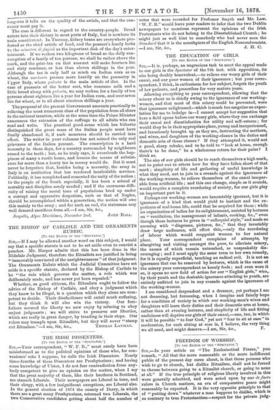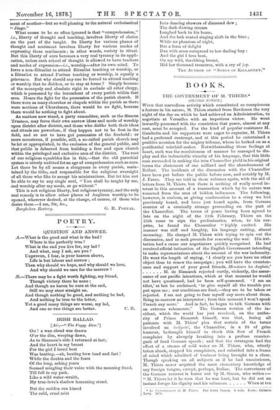FREEDOM OF WORSHIP.
[TO THE EDITOR OF THE " SPECTATOR."]
SIR,—In your article on " The Ecclesiastical Fracas," you/ remark, " All that the more reasonable or the more indifferent public of the present day cares about, is that those persons who wish to go to church, but dislike Ritualism, shall not be forced to choose between going to a Ritualist church, or going to none at all." If the true principle of religious liberty involved in this were generally admitted, and were acted upon by our de facto rulers in Church matters, an era of comparative peace might reasonably be expected. It is the very opposite principle to that of " putting down " whatever a man happens to dislike, which is so contrary to true Protestantism—respect for the private judg- went of another—but so well pleasing to the natural ecclesiastical " Jingo."
What seems to be so often ignored is that "comprehension," i.e., liberty of thought and teaching, involves liberty of choice on the part of the taught. So liberty for various phases of thought and sentiment involves liberty for various modes of expressing these sentiments ; in other words, variety in ritual. But this liberty of ours becomes a very real tyranny in its appli- cation, unless each school of thought is allowed to have teachers and modes of expression—i.e., worship—after its own mind. To force a non-Ritualist to attend Ritualist teaching or worship, or a Ritualist to attend Puritan teaching or worship, is equally a grievance. But why should any one be forced to attend teaching or worship that he dislikes, or to stay at home ? Simply because of the monopoly and absolute right to exclude all other clergy, which is possessed by the incumbent of every parish within that area. Hence the fight for the possession of the parish church. If there were as many churches or chapels within the parish as there were sections of Churchmen, there would be no fight, because -there would be nothing to fight about.
As matters now stand, a party committee, such as the Simeon Trustees, may force their own narrow ideas and mode of worship upon district after district, and those who dislike both their ideas and rituals are powerless, if they happen not to be first in the field, and so not to have got possession of the freehold ; or more monstrous, if possible, still, a so-called parish church may be let or appropriated, to the exclusion of the general public, and that public is debarred from building a free and open church within the privileged and exclusive area of the district. The root of our religious squabbles lies in this,—that the old parochial system is utterly unfitted for an age of comprehension such as ours. Let there be by all means a clergyman in every parish, main- tained by the tithe, and responsible for the religious oversight of all those who like to accept his ministrations. But let him not be able to say to any single soul, "You shall be taught by me, and worship after my mode, or go without."
This is not religious liberty, but religious tyranny, and the only real remedy is to allow other places of Anglican worship to be opened, wherever desired, at the charge, of course, of those who ,desire them.—I am, Sir, &c.,



































 Previous page
Previous page